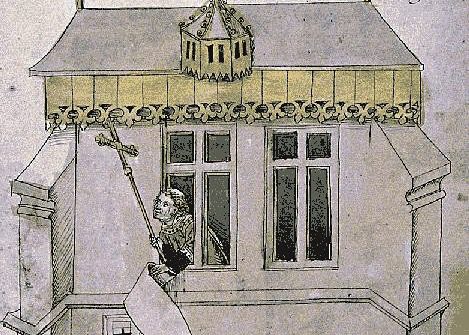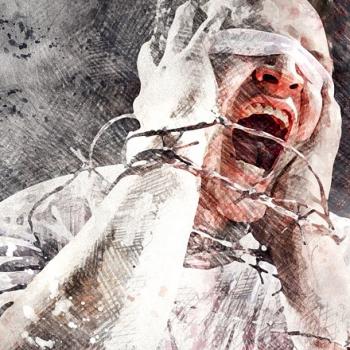
A reader points to Canon 194 as a possible opening for deposing a heretical pope. The canon lists certain conditions under which a person is “removed from an ecclesiastical office by the law itself.” These are:
- A person who has lost the clerical state; [i.e., the priesthood]
- A person who has publicly defected from the Catholic faith or from the communion of the Church
- A cleric who has attempted marriage even if only civilly
The canon adds an important qualification:
The removal mentioned in nn. 2 and 3 can be enforced only if it is established by the declaration of a competent authority.
But assuming the papacy is an “ecclesiastical office,” one first has to consider whether any of these latae sententiae removals apply to a heretical pope.
The first has to do with the loss of the priesthood. Does a heretic pope ipso facto lose the priesthood, and with the priesthood the papacy? Has anyone shown this to be so? Since when does a heretic priest (who is not the pope) lose the priesthood by that fact alone? He’d have to be found a heretic in a canonical trial, right? And then his bishop would have to laicize him? Right? Who has the authority to laicize the pope?
The second deals with the public renunciation of the faith. This seems to me to be a bit larger than simply “being a heretic.” My experience is, there are a large number of heretics in the Church who have not renounced the faith. I would also guess that if a pope were to publicly renounce the faith, he would renounce the papacy along with it. Why go on being pope if you’ve renounced Catholicism? “The papacy is a tradition of men!” he would say, cast down his mitre, and join the Mormon Tabernacle Choir. In this case, we’d be talking about something altogether different from heresy: We’d be talking about apostasy.
The third is simply not at issue. No one is asking, “What if the pope meets some nice lady and wants to get married?”
But even if any of these applied, we would have the stipulation of paragraph 2, which is that the loss of ecclesiastical office needs to be “established by the competent authority.” In the case of the pope, who is “the competent authority”?
And there we come full circle again to Canon 1404: “The first see is judged by no one.”
***
Canon lawyer Dr. Edward N. Peters has written a “Canonical Primer on Popes and Heresy.” And he says that one should not speak lightly of such matters. “Those flirting with such suspicions or engaging in such ruminations,” he says, “should be very clear about what is at issue.”
Heresy, for discussion’s sake, is “the obstinate denial or obstinate doubt after the reception of baptism of some truth that must be believed by divine and catholic faith.” That’s a high bar. “Moreover,” says Dr. Peters,
privately-held heretical views, even if they are leading to certain observable actions, are not in themselves actionable under law (Canon 1330).
That’s true for anyone, not just the pope. And Dr. Peters rightly dismisses as “impossible” any notion that a pope would commit the Church to heresy. That is distinct, however, from saying that a pope could be a heretic and could promote his heresy publicly. (Not everything a pope says publicly binds the Church.)
(Dr. Peters stresses here that the possibility of a pope being a heretic, even apart from binding the Church, is “very remote” [his italics]. He cites Vermeersch-Creusen, who calls it “quite improbable”; Beste, who says that “no example of this can be found”; and Cappello, who says the very notion should be “entirely dismissed.” I agree with Cappello, and I assume that Beste examined the facts about Honorius I and John XXII and found no convincing evidence of actual heresy.)
But in terms of the “what if?” question, Dr. Peters thinks that canon law has “more to offer” than simply Canon 1404. He cites Wrenn:
Canon 1404 is not a statement of personal impeccability or inerrancy of the Holy Father. [Certainly not. And I know of no one who claims that it is.] Should, indeed, the pope fall into heresy, it is understood that he would lose his office.
Yes, but how? Who would determine that a pope had “fallen into heresy”? Surely the pope would have the right to a canonical trial. Who would conduct that trial? I suppose most people would probably say the College of Cardinals, or the CDF. And if he were to be found guilty of heresy, he would automatically forfeit the papacy. But where does Canon law say this? It doesn’t. “It is understood” is not a citation from canon law.
And indeed Wrenn admits that Canon 1404 does not settle the question of who would try a pope for heresy. Dr. Peters adds that there is no other canon that does answer this pertinent question. (Not even canon 194.) “But,” he says (for there is always a but), perhaps the “canonical tradition” would have an answer.
He takes us to Franz Wernz, who seems to do no more than offer a re-presentation of Bellarmine’s discussion in De Romano Pontafice. Wernz accepts Bellarmine’s view that a heretical pope loses his office latae sententiae. Wernz says that a “declaratory criminal sentence” that the pope was “found to be heretical” (by whom?) would be declared by a “general council.” This though he earlier said that a council does not have a higher jurisdiction than the pope. The discussion in Wernz (and in Bellarmine) is circular: No one could try a pope, no one could remove a pope, but a pope would lose his office anyway, because he would, because he would have to.
So while admitting that a heretical pope “must be deprived of his power,” Wernz has no answer at all as to who would do the depriving. He simply says that it “would” happen.
Which more or less leaves us right where we started.












